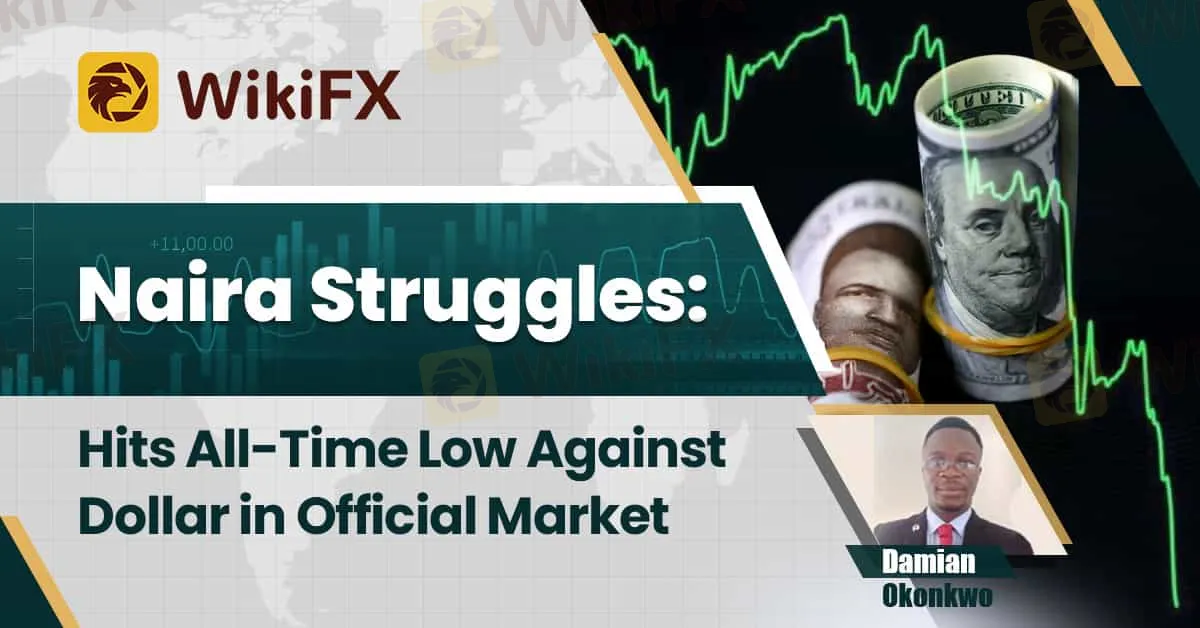简体中文
繁體中文
English
Pусский
日本語
ภาษาไทย
Tiếng Việt
Bahasa Indonesia
Español
हिन्दी
Filippiiniläinen
Français
Deutsch
Português
Türkçe
한국어
العربية
Naira Struggles: Hits All-Time Low Against Dollar in Official Market
Abstract:The Naira's struggles are a complex issue with no easy solutions.

By: Damian Okonkwo

The Nigerian Naira has faced serious challenges since 2024, reaching record lows against the US Dollar in both the official and parallel foreign on February 20th, 2024; to trade at the lowest rate ever at N1,620.96 per $1 on the FMDQ Exchange, which is the official platform for official foreign exchange trading.
The situation seen in the parallel market, a less regulated space, is even more concerning. Here, the Naira crossed the N1,750 per $1 mark, to nearly N2000 per $ same day, further highlighting the pressure on the currency.
Factors Contributing to the Decline:
There are many factors that may have contributed to the current devaluation of the Naira. These includes:
A. Dollar scarcity: The primary driver of the Naira's depreciation is the limited availability of US Dollars in the Nigerian market. This scarcity could be attributed to:
● Lower oil revenue: Oil exports are a major source of foreign exchange for Nigeria. However, a decline in global oil prices and production issues have restricted this income.
● Increased demand for dollars: The demand for dollars has risen due to factors like:
● Import dependency: Nigeria relies heavily on imports, requiring foreign currency for purchases.
● Capital flight: Investors and businesses are shifting their funds outside Nigeria due to economic uncertainties, further reducing dollar availability.
B. Central Bank of Nigeria (CBN) policies: The CBN's attempts to manage the situation through:
● Multiple exchange rate system: Maintaining different exchange rates for different transactions has created complexities and uncertainties in the market.
● Currency controls: Restricting access to foreign exchange for certain individuals and businesses has impacted accessibility and transparency.
The Impact on the Economy
The Naira's depreciation has widespread negative consequences:
a) Import costs: Higher exchange rates make it more expensive to import goods, leading to inflation, impacting the cost of living for Nigerians.
b) Investment climate: Uncertainty in the foreign exchange market discourages foreign investment, hindering economic growth.
c) Savings and purchasing power: The declining value of the Naira weakens the purchasing power of individuals and businesses holding Naira, impacting their savings and investments.
The Response:
The CBN has taken steps to address the situation, including:
● Injecting dollars into the official market: The CBN has intervened to increase dollar availability, but the impact of these interventions remains limited.
● Clearing foreign exchange backlogs: Addressing specific forex demands, like backlogs owed to airlines, aims to alleviate pressure in certain sectors.
Possible ways out:
Observing the current situation of the country, experts urge the government to:
● Focus on diversifying the economy: Reducing reliance on oil exports and fostering other sectors can lessen dependence on foreign currency.
● Promote transparency and predictability in foreign exchange policies: Clear and consistent policies can build trust and encourage investment.
Conclusion
The Naira's struggles are a complex issue with no easy solutions. Addressing the underlying factors that contribute to the dollar scarcity and implementing comprehensive economic reforms are crucial for stabilising the exchange rate and fostering sustainable economic growth in Nigeria.

Disclaimer:
The views in this article only represent the author's personal views, and do not constitute investment advice on this platform. This platform does not guarantee the accuracy, completeness and timeliness of the information in the article, and will not be liable for any loss caused by the use of or reliance on the information in the article.
Read more

Will natural disasters have an impact on the forex market?
The forex market is known for its rapid responses to global events, but the influence of natural disasters, such as earthquakes and typhoons, can be less straightforward. While headlines may scream about catastrophic damage and economic disruption, the long-term effects on currency values often depend on a blend of immediate shock and underlying economic fundamentals.

Navigating the Intersection of Forex Markets, AI Technology, and Fintech
The financial world is transforming, driven by the rapid integration of artificial intelligence (AI) and innovative fintech solutions. This change is most apparent in forex markets, where algorithmic trading and deep learning are redefining strategies, risk management, and decision-making. In this article, we explore how AI-driven technologies are not only revolutionizing forex trading but are also propelling fintech innovations that enhance customer experiences, bolster security, and unlock new market opportunities.

The One Fear That’s Costing You More Than Just Profits
The fear of missing out (FOMO) is NOT what you think it is! Read the three lesser-discussed components that contribute greatly to FOMO trading!

SocialFi and the Forex Market: A New Era for Decentralized Social Trading?
The worlds of social media and decentralized finance (DeFi) have converged under a new banner—SocialFi. Short for “Social Finance,” SocialFi leverages blockchain technology to reward user engagement, giving individuals direct control over their data and interactions. While SocialFi has primarily emerged in the context of content creation and crypto communities, its principles could soon revolutionize the forex market by reshaping how traders share insights and monetize social influence.
WikiFX Broker
Latest News
How Crypto Trading Transforms FX and CFD Brokerage Industry
UK would not hesitate to retaliate against US tariffs - No 10 sources
FCA Warns Against 10 Unlicensed or Clone Firms
CySEC Warns Against 14 Unlicensed Investment Websites
Top Currency Pairs to Watch for Profit This Week - March 31, 2025
Will natural disasters have an impact on the forex market?
Philippines Deports 29 Indonesians Linked to Online Scam Syndicate in Manila
Navigating the Intersection of Forex Markets, AI Technology, and Fintech
Exposed: Deceptive World of Fake Trading Gurus – Don’t Get Fooled!
AI-Powered Strategies to Improve Profits in Forex Trading
Currency Calculator







